- Home
- Raymond Chandler
The Long Goodbye Page 2
The Long Goodbye Read online
Page 2
“Look,” I said, “I’d put up what you need. I’m no big soft-hearted slob. So you take what’s offered and be good. I want you out of my hair because I’ve got a feeling about you.”
“Really?” He looked down into his glass. He was only sipping the stuff. “We’ve only met twice and you’ve been more than white to me both times. What sort of feeling?”
“A feeling that next time I’ll find you in worse trouble than I can get you out of. I don’t know just why I have the feeling, but I have it.”
He touched the right side of his face gently with two fingertips. “Maybe it’s this. It does make me look a little sinister, I suppose. But it’s an honorable wound—or anyhow the result of one.”
“It’s not that. That doesn’t bother me at all. I’m a private dick. You’re a problem that I don’t have to solve. But the problem is there. Call it a hunch. If you want to be extra polite, call it a sense of character. Maybe that girl didn’t walk out on you at The Dancers just because you were drunk. Maybe she had a feeling too.”
He smiled faintly. “I was married to her once. Her name is Sylvia Lennox. I married her for her money.”
I stood up scowling at him. “I’ll fix you some scrambled eggs. You need food.”
“Wait a minute, Marlowe. You’re wondering why if I was down and out and Sylvia had plenty I couldn’t ask her for a few bucks. Did you ever hear of pride?”
“You’re killing me, Lennox.”
“Am I? My kind of pride is different. It’s the pride of a man who has nothing else. I’m sorry if I annoy you.”
I went out to my kitchen and cooked up some Canadian bacon and scrambled eggs and coffee and toast. We ate in the breakfast nook. The house belonged to the period that always had one.
I said I had to go to the office and would pick up his suitcase on the way back. He gave me the check ticket. His face now had a little color and the eyes were not so far back in his head that you had to grope for them.
Before I went out I put the whiskey bottle on the table in front of the couch. “Use your pride on that,” I said.
“And call Vegas, if only as a favor to me.”
He just smiled and shrugged his shoulders. I was still sore going down the steps. I didn’t know why, any more than I knew why a man would starve and walk the streets rather than pawn his wardrobe. Whatever his rules were he played by them.
The suitcase was the damndest thing you ever saw. It was bleached pigskin and when new had been a pale cream color. The fittings were gold. It was English made and if you could buy it here at all, it would cost more like eight hundred than two.
I planked it down in front of him. I looked at the bottle on the cocktail table. He hadn’t touched it. He was as sober as I was. He was smoking, but not liking that very well.
“I called Randy,” he said. “He was sore because I hadn’t called him before.”
“It takes a stranger to help you,” I said. “A present from Sylvia?” I pointed at the suitcase.
He looked out of the window. “No. That was given to me in England, long before I met her. Very long ago indeed. I’d like to leave it with you if you could lend me an old one.”
I got five double sawbucks out of my wallet and dropped them in front of him. “I don’t need security.”
“That wasn’t the idea at all. You’re no pawnbroker. I just don’t want it with me in Vegas. And I don’t need this much money.”
“Okay. You keep the money and I’ll keep the suitcase. But this house is easy to burgle.”
“It wouldn’t matter,” he said indifferently. “It wouldn’t matter at all.”
He changed his clothes and we ate dinner at Musso’s about five-thirty. No drinks. He caught the bus on Cahuenga and I drove home thinking about this and that. His empty suitcase was on my bed where he had unpacked it and put his stuff in a lightweight job of mine. His had a gold key which was in one of the locks. I locked the suitcase up empty and tied the key to the handle and put it on the high shelf in my clothes closet. It didn’t feel quite empty, but what was in it was no business of mine.
It was a quiet night and the house seemed emptier than usual. I set out the chessmen and played a French defense against Steinitz. He beat me in forty-four moves, but I had him sweating a couple of times.
The phone rang at nine-thirty and the voice that spoke was one I had heard before.
“Is this Mr. Philip Marlowe?”
“Yeah. I’m Marlowe.”
“This is Sylvia Lennox, Mr. Marlowe. We met very briefly in front of The Dancers one night last month. I heard afterwards that you had been kind enough to see that Terry got home.”
“I did that.”
“I suppose you know that we are not married any more, but I’ve been a little worried about him. He gave up the apartment he had in Westwood and nobody seems to know where he is.”
“I noticed how worried you were the night we met.”
“Look, Mr. Marlowe, I’ve been married to the man. I’m not very sympathetic to drunks. Perhaps I was a little unfeeling and perhaps I had something rather important to do. You’re a private detective and this can be put on a professional basis, if you prefer it.”
“It doesn’t have to be put on any basis at all, Mrs. Lennox. He’s on a bus going to Las Vegas. He has a friend there who will give him a job.”
She brightened up very suddenly. “Oh—to Las Vegas? How sentimental of him. That’s where we were married.”
“I guess he forgot,” I said, “or he would have gone somewhere else.”
Instead of hanging up on me she laughed. It was a cute little laugh. “Are you always as rude as this to your clients?”
“You’re not a client, Mrs. Lennox.”
“I might be someday. Who knows? Let’s say to your lady friends, then.”
“Same answer. The guy was down and out, starving, dirty, without a bean. You could have found him if it had been worth your time. He didn’t want anything from you then and he probably doesn’t want anything from you now.”
“That,” she said coolly, “is something you couldn’t possibly know anything about. Good night.” And she hung up.
She was dead right, of course, and I was dead wrong. But I didn’t feel wrong. I just felt sore. If she had called up half an hour earlier I might have been sore enough to beat the hell out of Steinitz—except that he had been dead for fifty years and the chess game was out of a book.
THREE
Three days before Christmas I got a cashier’s check on a Las Vegas bank for $100. A note written on hotel paper came with it. He thanked me, wished me a Merry Christmas and all kinds of luck and said he hoped to see me again soon. The kick was in a postscript. “Sylvia and I are starting a second honeymoon. She says please don’t be sore at her for wanting to try again.”
I caught the rest of it in one of those snob columns in the society section of the paper. I don’t read them often, only when I run out of things to dislike.
“Your correspondent is all fluttery at the news that Terry and Sylvia Lennox have rehitched at Las Vegas, the dears. She’s the younger daughter of multimillionaire Harlan Potter of San Francisco and Pebble Beach, of course. Sylvia is having Marcel and Jeanne Duhaux redecorate the entire mansion in Encino from basement to roof in the most devastatingly dernier cri. Curt Westerheym, Sylvia’s last but one, my dears, gave her the little eighteen-room shack for a wedding present, you may remember. And whatever happened to Curt, you ask? Or do you? St. Tropez has the answer, and permanently I hear. Also a certain very, very blue-blooded French duchess with two perfectly adorable children. And what does Harlan Potter think of the remarriage, you may also ask? One can only guess. Mr. Potter is one person who but never gives an interview. How exclusive can you get darlings?”
I threw the paper into the corner and turned on the TV set. After the society page dog vomit even the wrestlers looked good. But the facts were probably right. On the society page they better be.
I had a mental picture of the kin
d of eighteen-room shack that would go with a few of the Potter millions, not to mention decorations by Duhaux in the last subphallic symbolism. But I had no mental picture at all of Terry Lennox loafing around one of the swimming pools in Bermuda shorts and phoning the butler by R/T to ice the champagne and get the grouse atoasting. There was no reason why I should have. If the guy wanted to be somebody’s woolly bear, it was no skin off my teeth. I just didn’t want to see him again. But I knew I would—if only on account of his goddam gold-plated pigskin suitcase.
It was five o’clock of a wet March evening when he walked into my down-at-heels brain emporium. He looked changed. Older, very sober and severe and beautifully calm. He looked like a guy who had learned to roll with a punch. He wore an oyster-white raincoat and gloves and no hat and his white hair was as smooth as a bird’s breast.
“Let’s go to some quiet bar and have a drink,” he said, as if he had been in ten minutes before. “If you have the time, that is.”
We didn’t shake hands. We never did. Englishmen don’t shake hands all the time like Americans and although he wasn’t English he had some of the mannerisms.
I said: “Let’s go by my place and pick up your fancy suitcase. It kind of worries me.”
He shook his head. “It would be kind of you to keep it for me.
“Why?”
“I just feel that way. Do you mind? It’s a sort of link with a time when I wasn’t a no-good waster.”
“Nuts to that,” I said. “But it’s your business.”
“If it bothers you because you think it might be stolen—”
“That’s your business too. Let’s go get that drink.”
We went to Victor’s. He drove me in a rust-colored Jupiter-Jowett with a flimsy canvas rain top under which there was only just room for the two of us. It had pale leather upholstery and what looked like silver fittings. I’m not too fussy about cars, but the damn thing did make my mouth water a little. He said it would do sixty-five in second. It had a squatty little gear shift that barely came up to his knee.
“Four speeds,” he said. “They haven’t invented an automatic shift that will work for one of these jobs yet. You don’t really need one. You can start it in third even uphill and that’s as high as you can shift in traffic anyway.”
“Wedding present?”
“Just a casual ‘I happened to see this gadget in a window’ sort of present. I’m a very pampered guy.”
“Nice,” I said. “If there’s no price tag.”
He glanced at me quickly and then put his eyes back on the wet pavement. Double wipers swished gently over the little windscreen. “Price tag? There’s always a price tag, chum. You think I’m not happy maybe?”
“Sorry, I was out of line.”
“I’m rich. Who the hell wants to be happy?” There was a bitterness in his voice that was new to me.
“How’s your drinking?”
“Perfectly elegant, old top. For some strange reason I seem to be able to handle the stuff. But you never know, do you?”
“Perhaps you were never really a drunk.”
We sat in a corner of the bar at Victor’s and drank gimlets. “They don’t know how to make them here,” he said. “What they call a gimlet is just some lime or lemon juice and gin with a dash of sugar and bitters. A real gimlet is half gin and half Rose’s Lime Juice and nothing else. It beats martinis hollow.”
“I was never fussy about drinks. How did you get on with Randy Starr? Down my street he’s called a tough number.”
He leaned back and looked thoughtful. “I guess he is. I guess they all are. But it doesn’t show on him. I could name you a couple of lads in the same racket in Hollywood that act the part. Randy doesn’t bother. In Las Vegas he’s a legitimate businessman. You look him up next time you’re there. He’ll be your pal.”
“Not too likely. I don’t like hoodlums.”
“That’s just a word, Marlowe. We have that kind of world. Two wars gave it to us and we are going to keep it. Randy and I and another fellow were in a jam once. It made a sort of bond between us.”
“Then why didn’t you ask him for help when you needed it?”
He drank up his drink and signaled the waiter. “Because he couldn’t refuse.”
The waiter brought fresh drinks and I said: “That’s just talk to me. If by any chance the guy owed you something, think of his end. He’d like a chance to pay something back.
He shook his head slowly. “I know you’re right. Of course I did ask him for a job. But I worked at it while I had it. As for asking favors or handouts, no.”
“But you’ll take them from a stranger.”
He looked me straight in the eye. “The stranger can keep going and pretend not to hear.”
We had three gimlets, not doubles, and it didn’t do a thing to him. That much would just get a real souse started. So I guess maybe he was cured at that.
Then he drove me back to the office.
“We have dinner at eight-fifteen,” he said. “Only millionaires can afford it. Only millionaires’ servants will stand for it nowadays. Lots of lovely people coming.”
From then on it got to be a sort of habit with him to drop in around five o’clock. We didn’t always go to the same bar, but oftener to Victor’s than anywhere else. It may have had some association for him that I didn’t know about. He never drank too much, and that surprised him.
“It must be something like the tertian ague,” he said. “When it hits you it’s bad. When you don’t have it, it’s as though you never did have it.”
“What I don’t get is why a guy with your privileges would want to drink with a private eye.”
“Are you being modest?”
“Nope. I’m just puzzled. I’m a reasonably friendly type but we don’t live in the same world. I don’t even know where you hang out except that it’s Encino. I should guess your home life is adequate.”
“I don’t have any home life.”
We were drinking gimlets again. The place was almost empty. There was the usual light scattering of compulsive drinkers getting tuned up at the bar on the stools, the kind that reach very slowly for the first one and watch their hands so they won’t knock anything over.
“I don’t get that. Am I supposed to?”
“Big production, no story, as they say around the movie lots. I guess Sylvia is happy enough, though not necessarily with me. In our circle that’s not too important. There’s always something to do if you don’t have to work or consider the cost. It’s no real fun but the rich don’t know that. They never had any. They never want anything very hard except maybe somebody else’s wife and that’s a pretty pale desire compared with the way a plumber’s wife wants new curtains for the living room.”
I didn’t say anything. I let him carry the ball.
“Mostly I just kill time,” he said, “and it dies hard. A little tennis, a little golf, a little swimming and horseback riding, and the exquisite pleasure of watching Sylvia’s friends trying to hold out to lunch time before they start killing their hangovers.”
“The night you went to Vegas she said she didn’t like drunks.”
He grinned crookedly. I was getting so used to his scarred face that I only noticed it when some change of expression emphasized its one-sided woodenness.
“She meant drunks without money. With money they are just heavy drinkers. If they vomit in the lanai, that’s for the butler to handle.”
“You didn’t have to have it the way it is.”
He finished his drink at a gulp and stood up. “I’ve got to run, Marlowe. Besides I’m boring you and God knows I’m boring myself.”
“You’re not boring me. I’m a trained listener. Sooner or later I may figure out why you like being a kept poodle.”
He touched his scars gently with a fingertip. He had a remote little smile. “You should wonder why she wants me around, not why I want to be there, waiting patiently on my satin cushion to have my head patted.”
“Yo
u like satin cushions,” I said, as I stood up to leave with him. “You like silk sheets and bells to ring and the butler to come with his deferential smile.”
“Could be. I was raised in an orphanage in Salt Lake City.”
We went out into the tired evening and he said he wanted to walk. We had come in my car, and for once I had been fast enough to grab the check. I watched him out of sight. The light from a store window caught the gleam of his white hair for a moment as he faded into the light mist.
I liked him better drunk, down and out, hungry and beaten and proud. Or did I? Maybe I just liked being top man. His reasons for things were hard to figure. In my business there’s a time to ask questions and a time to let your man simmer until he boils over. Every good cop knows that. It’s a good deal like chess or boxing. Some people you have to crowd and keep off balance. Some you just box and they will end up beating themselves.
He would have told me the story of his life if I had asked him. But I never even asked him how he got his face smashed. If I had and he told me, it just possibly might have saved a couple of lives. Just possibly, no more.
FOUR
The last time we had a drink in a bar was in May and it was earlier than usual, just after four o’clock. He looked tired and thinner but he looked around with a slow smile of pleasure.
“I like bars just after they open for the evening. When the air inside is still cool and clean and everything is shiny and the barkeep is giving himself that last look in the mirror to see if his tie is straight and his hair is smooth. I like the neat bottles on the bar back and the lovely shining glasses and the anticipation. I like to watch the man mix the first one of the evening and put it down on a crisp mat and put the little folded napkin beside it. I like to taste it slowly. The first quiet drink of the evening in a quiet bar—that’s wonderful.”
I agreed with him.
“Alcohol is like love,” he said. “The first kiss is magic, the second is intimate, the third is routine. After that you take the girl’s clothes off.”

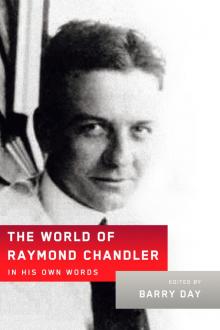 The World of Raymond Chandler: In His Own Words
The World of Raymond Chandler: In His Own Words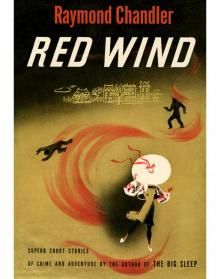 Red Wind: A Collection of Short Stories
Red Wind: A Collection of Short Stories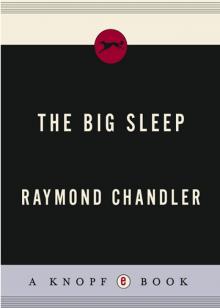 The Big Sleep
The Big Sleep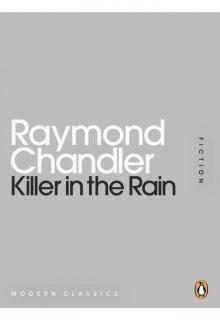 Killer in the Rain
Killer in the Rain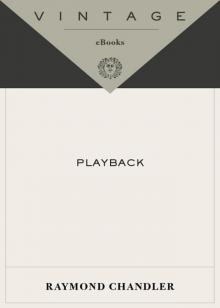 Playback
Playback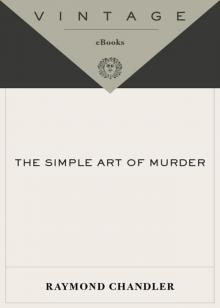 The Simple Art of Murder
The Simple Art of Murder The Bronze Door
The Bronze Door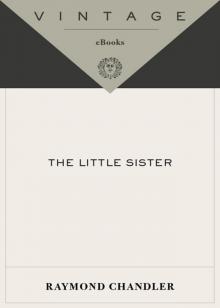 The Little Sister
The Little Sister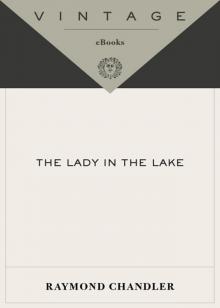 The Lady in the Lake
The Lady in the Lake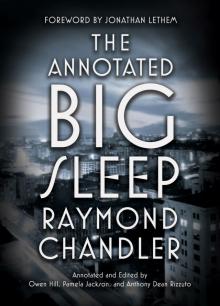 The Annotated Big Sleep
The Annotated Big Sleep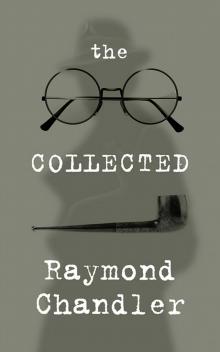 The Collected Raymond Chandler
The Collected Raymond Chandler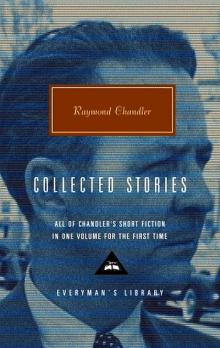 Collected Stories (Everyman's Library)
Collected Stories (Everyman's Library)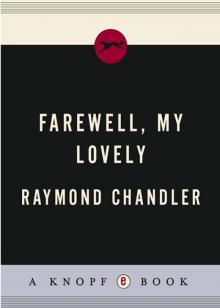 Farewell, My Lovely
Farewell, My Lovely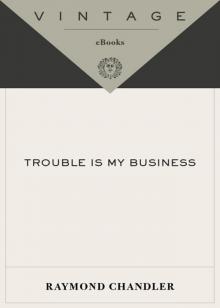 Trouble Is My Business
Trouble Is My Business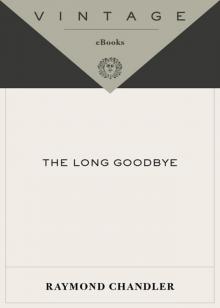 The Long Goodbye
The Long Goodbye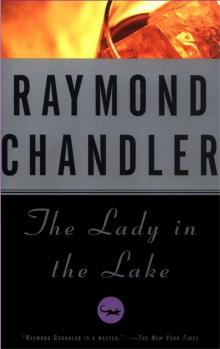 The Lady in the Lake pm-4
The Lady in the Lake pm-4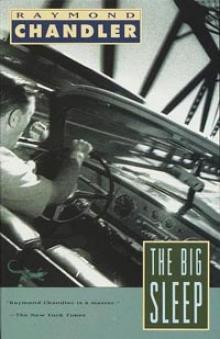 The Big Sleep pm-1
The Big Sleep pm-1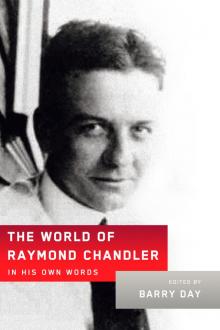 The World of Raymond Chandler
The World of Raymond Chandler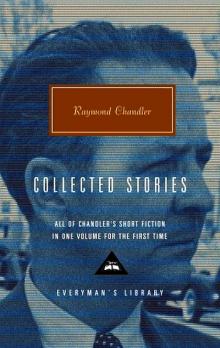 Collected Stories of Raymond Chandler
Collected Stories of Raymond Chandler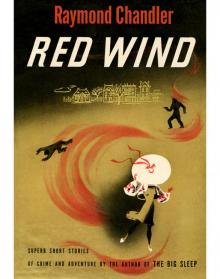 Red Wind
Red Wind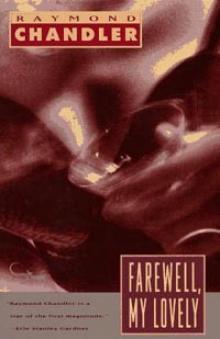 Farewell, My Lovely pm-2
Farewell, My Lovely pm-2 The Raymond Chandler Papers: Selected Letters and Nonfiction, 1909–1959
The Raymond Chandler Papers: Selected Letters and Nonfiction, 1909–1959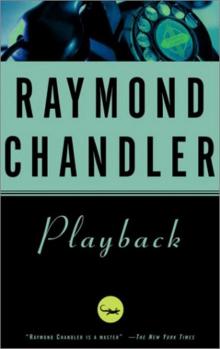 Playback pm-7
Playback pm-7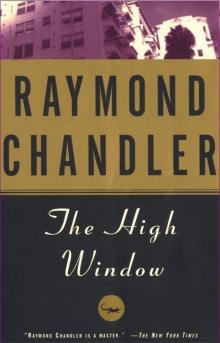 The High Window pm-3
The High Window pm-3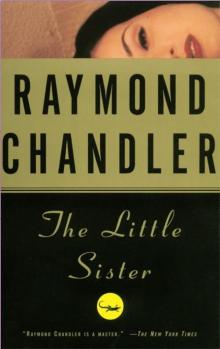 The Little Sister pm-5
The Little Sister pm-5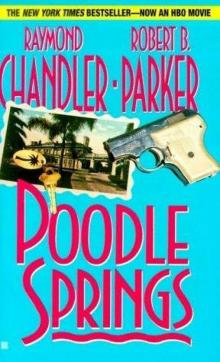 Poodle Springs (philip marlowe)
Poodle Springs (philip marlowe)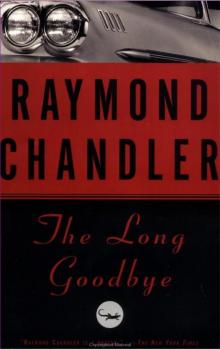 The Long Goodbye pm-6
The Long Goodbye pm-6